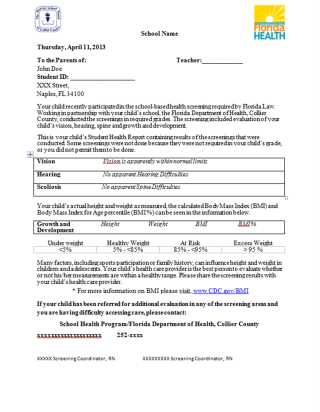
Florida mom Kristen Grasso received a “fat letter” from her child’s school letting her know that her athletic daughter — who at 5 feet 3 inches tall weighed 124 pounds — was at risk of being overweight.
This mom spoke out and prompted a greater conversation about BMI testing at school.
Childhood weight issues are a difficult subject. With no distinct lines between normal body diversity and obesity that puts children at risk of serious health issues, how do we keep kids healthy without damaging them emotionally? We asked parents to chime in on the school system’s role in monitoring weight and health.
How do “fat letters” affect kids?
In Kristen Grasso’s case, a sealed health letter was sent home in her 11-year-old daughter’s backpack. Kids are kids. It isn’t reasonable to send sensitive information home with a child — especially when that information could prompt serious problems with body image and eating habits. Though a quick BMI test might not directly increase bullying, it certainly causes distress in kids who are already concerned about weight and body image. Shouldn’t these screenings and reports be conducted with greater sensitivity and a focus on mental health as well as physical health? Read More here
This is how a seemingly good thing goes bad, primarily because of application and language. The letter in and of itself is not a bad idea. *The data comes from a regular screening process that occurs when students in are kindergarten, first, third, and sixth grades. Florida is one of 21 states that have laws requiring BMI screenings. Millsap said the health department is currently in the middle of screenings for this school year, but last year the department tested 13,454 children. About 25 percent had possible vision issues, less than 1 percent had possible hearing problems, 2 percent had scoliosis, and 43 percent had BMI issues, either above or below normal numbers. Parents can opt out of the screening for their children.
The problem is the way that Body Mass Index is calculated, it does not differentiate between fat and muscle- and muscle weight MORE than fat!!! So you could have a fit child who is mainly muscle, and possibly on the short side, appear to be what is considered obese on the charts. Sending letters home to parents, (they are also handed out to the children in school) can be irresponsible without taking an actual LOOK at the child in question. I can definitely see how such letters can potentially cause a great deal of distress, and even become the seedling for eating disorders, low self esteem and even bullying however I do think that Florida’s heart is in the right place. We in this country are greatly undereducated when it comes to health and nutrition—-WAIT let me take that back, we have a lot of information but at the same time our culture encourages us to be indulgent and dismissive about proper diet and health. I think that this sort of “check up” is not a bad thing, I recall our annual hearing and eye tests in school, it was helpful especially since it was there that they discovered that I needed glasses. I think the way the information is given, and the language used needs to be tweaked. Perhaps parents should have been brought in and asked how they would like to receive that sort of information about their child. It is very sensitive, and personal data, and even if it just a black and white fact on paper- your weight, height, BMI it feels like someone is judging you and that is never nice, nor is it helpful it shuts people down.
Perhaps the the BMI should not be included or the test should be more personalized and take into account body type as well. I also think that it might be interesting to have the First Lady’s Let’s Move campaign be somehow involved, so that it ties this information about their bodies into educating the children and their parents on ways to be more healthy over all. As we all know though obesity can be a factor in bad health being thin does not mean that you are healthy!
Video: Florida state laws mandating health screenings at school are sparking controversy after an athletic sixth-grader was sent home with a letter saying she had an “at-risk” body mass index and therefore was overweight.
Visit NBCNews.com for breaking news, world news, and news about the economy
